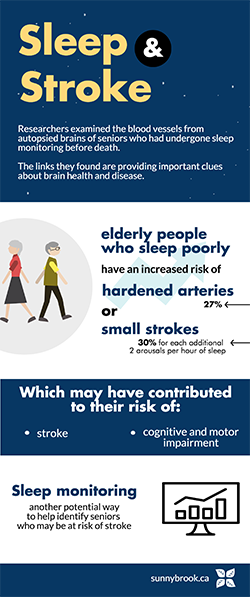Poor Sleep Linked to Hardened Blood Vessels, Small Strokes in Seniors
A Sunnybrook-led study suggests that elderly people who sleep poorly and awaken frequently are more likely to have hardened blood vessels or small strokes in the brain, bo th of which can contribute to cognitive and motor impairment.
th of which can contribute to cognitive and motor impairment.
Published in the journal Stroke, the study is the first to conduct a detailed examination of blood vessels from autopsied brains of seniors who had undergone sleep monitoring before death.
The researchers found that greater sleep fragmentation was associated with 27 per cent higher odds of having severe arteriosclerosis. For each additional two arousals during one hour of sleep, they reported a 30 per cent increase in the odds that subjects had visible signs of oxygen deprivation (infarcts) in their brain.
Fragmented sleep occurs when sleep is interrupted by repeated awakenings or arousals. In this study, sleep was disrupted on average almost seven times each hour.
ÛÏThere are several ways to view these findings: Sleep fragmentation may impair the circulation of blood to the brain, poor circulation of blood to the brain may cause sleep fragmentation, or both may be caused by another underlying risk factor,Û said Dr. Lim.
The findings suggest that sleep monitoring may potentially be another way to identify seniors who may be at risk of stroke.
